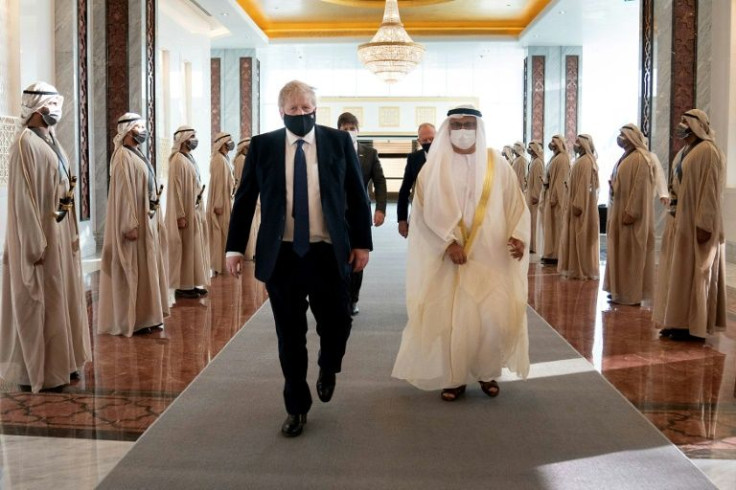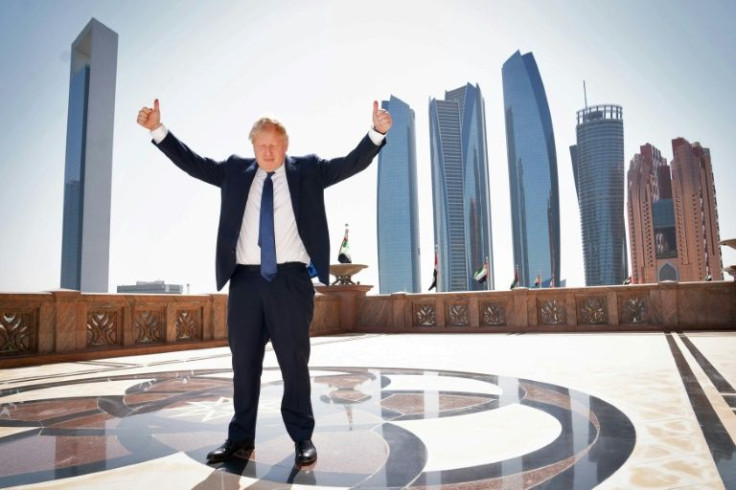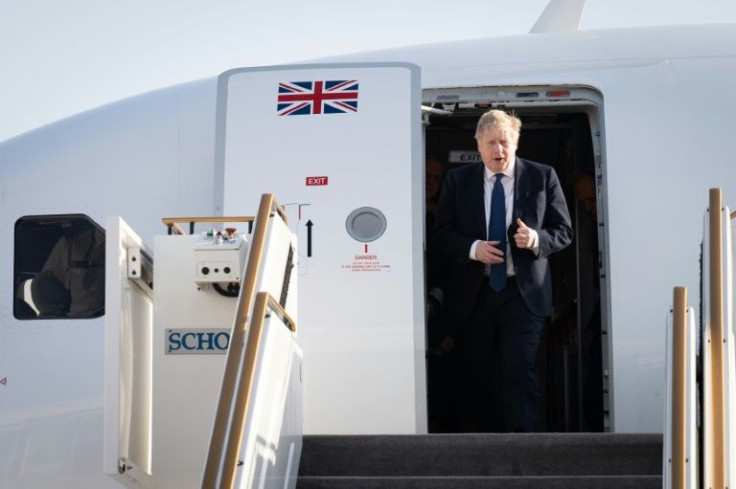British PM Meets Saudi, UAE Leaders As War Roils Oil Prices
British Prime Minister Boris Johnson began lobbying Saudi Arabia and the United Arab Emirates to pump more oil to calm markets roiled by Russia's invasion of Ukraine as he met the Gulf states' leadership on Wednesday.
Johnson arrived in Abu Dhabi for talks with Crown Prince Mohammed bin Zayed and was then due to fly to Riyadh as the West seeks to end its dependency on Russian oil following the invasion of Ukraine.
His visit, as oil prices seesaw in extreme volatility, coincides with fresh condemnation of Saudi Arabia's human rights record after 81 men were put to death in a mass execution on Saturday.
Johnson will also meet de facto Saudi leader Crown Prince Mohammed bin Salman as he becomes one of the few Western leaders to visit Riyadh since the 2018 murder of Saudi journalist Jamal Khashoggi.

Johnson, himself a former journalist, promised to raise human rights issues with Prince Mohammed, but also stressed Britain's "very important relationship" with the oil-rich Gulf.
He said the visit was also aimed at increasing investment in UK green energy, including the announcement of ?1 billion (1.2 billion euros) from Saudi Arabia's alfanar group for a project to produce sustainable aviation fuel from waste.
"It's not just a question of looking at the OPEC countries and what they can do to increase supply, though that is important," Johnson told British media.
"When we look at the dependency the West in particular has built up on Putin's hydrocarbons, on Putin's oil and gas, we can see what a mistake that was because he's been able to blackmail the West."
Johnson's spokesman said he would also ask Prince Mohammed to condemn Russia's President Vladimir Putin over the assault on Ukraine.

Saudi Arabia and the UAE, which are two of the world's biggest oil exporters and both have ties to Moscow, have so far avoided taking a position against Russia.
But Johnson said before leaving that the impact of Russian President Vladimir Putin's "brutal and unprovoked" assault will be felt far beyond Europe.
He said that as Western sanctions begin to bite, a new international coalition was needed to offset their impact on consumers already feeling the pinch from rising inflation and increases in the cost of living.

"The world must wean itself off Russian hydrocarbons and starve Putin's addiction to oil and gas," he said in a statement.
"Saudi Arabia and the United Arab Emirates are key international partners in that effort.
"We will work with them to ensure regional security, support the humanitarian relief effort and stabilise global energy markets for the longer term."
The UAE and Saudi Arabia are the UK's two largest economic partners in the region, with bilateral trade worth ?12.2 billion ($15.9 billion, 14.5 billion euros) and ?10.4 billion respectively in 2020, Johnson's office said.
The prime minister is hoping he can persuade Prince Mohammed to boost his kingdom's oil production to help lower spiralling prices that are pushing up household energy bills.
Germany last week issued an "urgent appeal" to the Saudi-led OPEC oil producers group to increase production "to create relief on the market" because of supply fears.
Russia is the world's largest producer of gas and second-largest oil producer behind OPEC kingpin Saudi Arabia.
But like the United States, Britain plans to phase out Russian oil imports by the end of the year, as part of wide-ranging sanctions targeting Russian businesses and billionaires.
US President Joe Biden and Prince Mohammed haven't spoken since Biden took office and vowed to treat the kingdom as a "pariah" state over Khashoggi's killing, which the CIA blamed on the Saudi royal.
Torbjorn Soltvedt, Middle East and North Africa analyst at Verisk Maplecroft, told AFP that "without this rift, it is unlikely Johnson would now be spearheading oil diplomacy efforts in the Gulf".
But he added that the odds were "stacked against Johnson as he seeks to secure a shift in Saudi and OPEC oil policy".
"Saudi Arabia has so far proved reluctant to deviate from the current OPEC+ framework and plan, which mandates incremental monthly production increases," he said.
Soltvedt said the UAE "may be more willing to open the taps" as it wants to capitalise on its oil reserves more quickly.
But the UAE on March 10 reaffirmed its commitment to OPEC+ alliance agreements to stick to existing output targets through April.
© Copyright AFP 2025. All rights reserved.




















